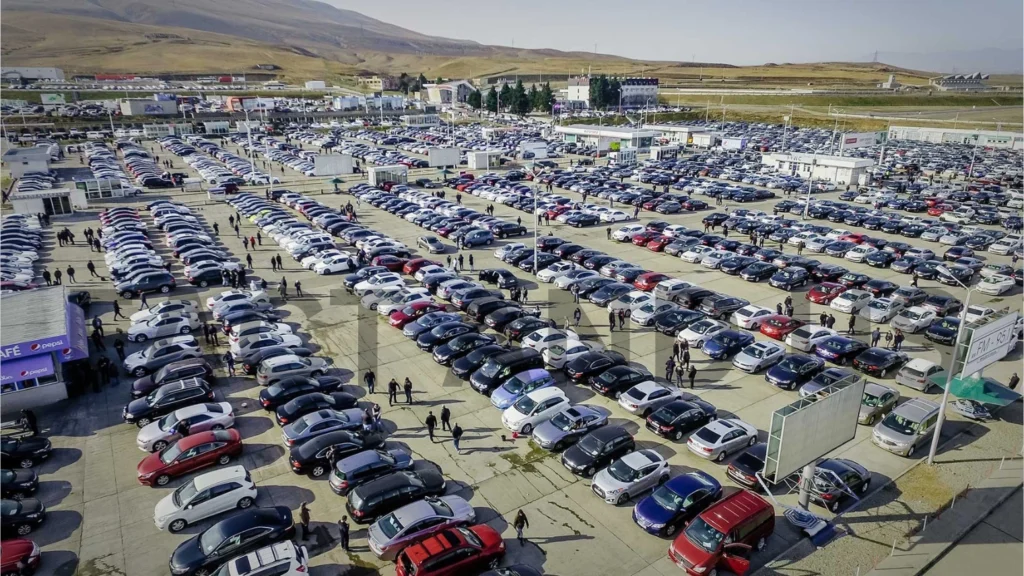The small South Caucasus nation of Georgia has become a multi-billion dollar hub for the international used car market. The vehicles are mostly sourced from the US, and many appear to be ending up in Russia. On the dusty outskirts of Rustavi, an industrial town 20km (12 miles) southeast of Georgia’s capital Tbilisi, is a vast area of open-air carparks. Equivalent in size to more than 40 football pitches, it hosts thousands of vehicles up for sale.

You can find pretty much any automobile your heart desires – Mercedes, Porsches, Jaguars, Toyotas and, more recently, Teslas. They are all here. One of the largest carparks is owned by Caucasus Auto Import (CAI), a company that buys used cars from auctions in the US. The vehicles have often been so badly damaged in accidents that they have been written-off by American insurance firms.
CAI says that its “team of experts” in the States will pick up the cars in person, and then arrange their export by container ship, 10,000km (6,000 miles) to a port on Georgia’s Black Sea coastline. The damaged cars will then be fixed by Georgian mechanics.
“Our company has contributed a lot to the renewal of the Georgian fleet of cars,” says David Gulashvili, CAI’s deputy chief executive. “When we started our business in 2004, Georgian automotive infrastructure was totally Soviet Union produced, like [Soviet brands] Lada and Vaz.”
He says that his company has responded to “a lot of demand for Western-produced vehicles”. Today the firm has 600 employees.Last year, Georgia imported $3.1bn (£2.4bn) worth of cars, according to official figures. It then exported vehicles to a value of $2.1bn, mainly to former Soviet republics in the Caucasus and Central Asia. Cars are in fact Georgia’s second-largest export by value, after copper ore.


Across the huge car market in Rustavi, curious customers are on the lookout for a deal. Each car has a card on the inside of its windscreen indicating price, engine size, and date of manufacture.Alisher Tezikbayev has travelled here from Kazakhstan. He and a group of his friends are exploring the Toyota section. “We’ve been re-exporting cars from Georgia for about 3.5 years. We send cars to Kazakhstan and organise auto tours, when clients come to Georgia to pick their own car,” says Mr Tezikbayev, who is posting videos to his 100k followers on Tik Tok.
Georgia used to export second-hand US and European cars to its northern neighbour Russia, with whom it shares a border. But that has officially stopped as a result of Russia’s invasion of Ukraine in 2022.
In September 2023, the Georgian Revenue Service announced that, in line with the then latest Western sanctions against Russia, it was restricting the re-export and transit of automobiles imported from the US or Europe to Russia and Belarus.
And Georgian officials have long denied that the country has been complicit in aiding Russia’s evasion of the trade embargoes. Yet a recent investigation by Georgian media publication Ifacti showed numerous loopholes exploited by an army of car dealers on both sides of the Russian-Georgian border.
David Gulashvili says that his company no longer has any trade with Russia. “From day one of the war we have restricted any kind of transactions from Russia, any kind of exports to Russia. You will not see a single car exported by Caucasus Auto Import to Russia.” However, he adds that there is no existing mechanism to monitor the final destination for re-exported cars going to other countries.
Contents
Georgia: A Car Hub in the Caucasus
Situated at the crossroads of Europe and Asia, Georgia has long served as a transit hub for trade in the region. However, in recent years, it has become a hotspot for the re-export of used cars from the United States, many of which are now ending up in Russia. The process is fairly straightforward. Buyers in Russia, unable to import vehicles directly from the US due to sanctions, purchase used cars through intermediaries in Georgia.

After being shipped from US ports, these cars land in Georgia’s coastal city of Batumi, where they are often inspected and repaired before being sold or transported across the border into Russia.
According to Georgian customs data, car imports from the United States have surged in recent months, and a growing portion of these vehicles are ultimately destined for Russian buyers.
Sanctions Evasion or Legal Loophole?
While the direct sale of cars to Russia from the US is restricted by sanctions, the re-export through third countries, like Georgia, often falls into a gray area. Georgian law does not prohibit the sale of vehicles to Russia, allowing the country to serve as an intermediary in what some see as a legal workaround to sanctions.
“It’s a complex situation,” said Giorgi Koberidze, a Georgian economist. “On one hand, Georgia is adhering to international sanctions. But on the other, its economy benefits from the trade of these vehicles. For many in Georgia, it’s just business, not politics.”
For Russia, where new cars are in short supply due to the impact of sanctions on domestic production and imports, this has provided a crucial lifeline. Older, affordable cars from the US, particularly SUVs and trucks, are in high demand among Russian consumers.
A Booming Trade
In Tbilisi and Batumi, car dealerships specializing in American-made vehicles have seen a sharp rise in business. One dealer in Batumi noted that 70% of his customers are Russian buyers, who either travel to Georgia to purchase cars or arrange for the vehicles to be shipped across the border.
“These cars are reliable, affordable, and meet the needs of many Russian families,” said the dealer, who requested anonymity. “We’re selling everything from sedans to SUVs, and the demand just keeps growing.”
In addition to cars, spare parts and repair services have become part of the booming trade, further deepening the economic ties between Georgia and Russia in this sector.
Economic Impact on Georgia
While the car trade is bringing in significant revenue for Georgia, it has sparked debate within the country. Some argue that facilitating trade with Russia undermines the broader international effort to isolate Moscow economically.

Others, however, point out that Georgia is in a precarious geopolitical position. The country relies on both Western support and economic ties with its larger neighbor, Russia. For many small businesses and workers in Georgia, the car trade offers much-needed income in a challenging economic climate.
“This is helping our economy recover after the pandemic,” said Nika Khvichia, a logistics manager involved in the car import business. “It’s not about politics for us—it’s about putting food on the table.”
Future of the Trade
As Western countries continue to monitor sanctions compliance, the re-export of cars through Georgia may come under greater scrutiny. For now, though, this pathway remains open, providing a lucrative opportunity for both Georgian businesses and Russian buyers looking to circumvent the restrictions.
Experts believe that unless stricter regulations are imposed, this trade route will continue to flourish. “It’s an example of how sanctions often lead to unintended consequences,” said Dr. Sergey Klyuyev, an expert in international trade. “Businesses adapt, and new supply chains emerge, often in ways that are difficult to control.”
For now, the streets of Russia will continue to see a growing number of American-made cars, many with a detour through Georgia, as the country plays an unexpected role in the complex web of global trade amidst ongoing geopolitical tensions.
stay connected with fact and us for more such news.
